ECO Science Foundation co-organized the 2nd International Conference on Climate Change and Disaster Risk Reduction in Beijing in collaboration with China-Pakistan Joint Research Center on Earth Sciences (CPJRC)
The ECO Science Foundation (ECOSF) actively participated as a co-organizer in the 2nd International Conference on Climate Change and Disaster Risk Reduction (IC-CCDRR), held on October 19–20, 2025, in Beijing, China. The conference was jointly organized by the China-Pakistan Joint Research Centre on Earth Sciences (CPJRC), the Chinese Academy of Sciences (CAS), UNESCO, Pakistan’s National Disaster Management Authority (NDMA), and Quaid-i-Azam University, along with other partners. The two-day event brought together more than 400 scientists, policymakers, and experts from across China, the ECO region, and international organizations.
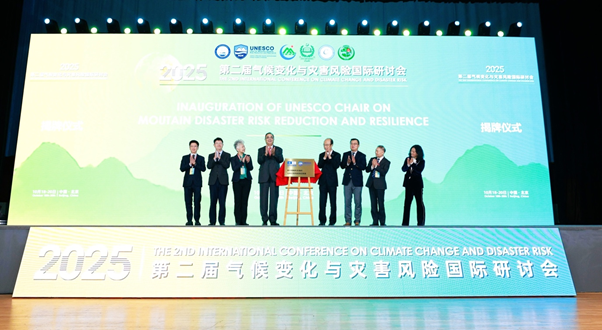
Over 400 experts and scholars from research institutions, universities, government agencies, and international organizations participated, discussing the impacts of climate change on natural disasters, mechanisms of hazard formation, and risk management strategies. The event aimed to enhance global understanding of climate–disaster interactions and to strengthen resilience against extreme events.
The conference also marked the launch of the UNESCO Chair on Mountain Disaster Risk Reduction, led by Academician Prof. Cui Peng, Chinese Academy of Sciences and Prof. Yang Saini, Beijing Normal University. This is the first UNESCO Chair hosted by CAS, focusing on mountain disaster prevention, resilience building, and regional collaboration across Asia. Four major scientific outcomes were released, including:
- The Mountain Disaster Risk Monitoring and Early Warning Platform,
- The 2024 Global Natural Disaster Assessment Report,
- The Digital China–Pakistan Economic Corridor Platform, and
- The Atlas of Natural Resources and Green Development of the CPEC.
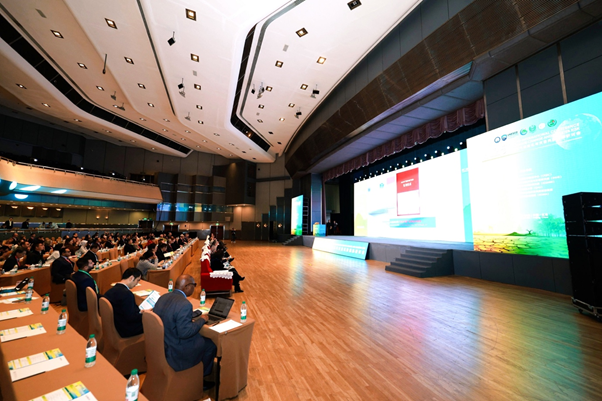
ECOSF hosted and led a session: “Leveraging Science, Technology and Innovation (STI) for Sustainable Development and Climate Resilience”
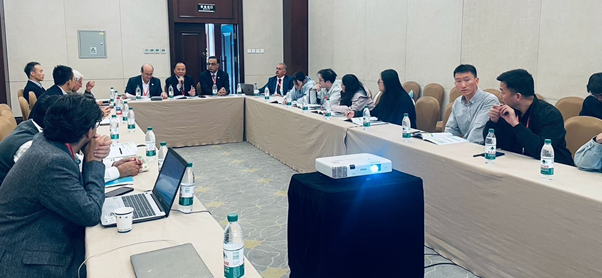
ECOSF co-organized and led a dedicated session titled “Leveraging Science, Technology and Innovation (STI) for Sustainable Development and Climate Resilience.”
The session, chaired by Prof. Seyed Komail Tayebi, President ECOSF, and co-moderated by Mr. Khalil Raza, Programme Manager (Energy & Climate), featured 10 speakers from China, Türkiye, Iran, and Pakistan.
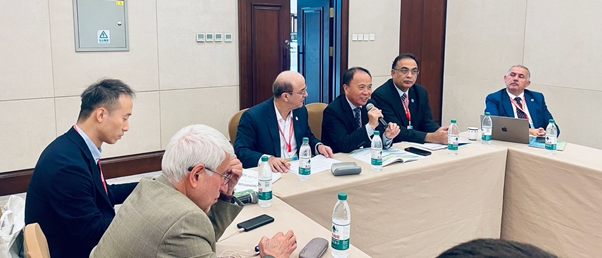
Prof. extended his gratitude to CPJRC for the partnership and welcomed participants on behalf of ECOSF. He underlined the Foundation’s commitment to fostering science, technology, and innovation (STI) to enhance resilience and sustainable growth across the ECO Member Countries.
The session continued with welcome remarks by Prof. Hong Tianhua, Executive Director of the China-Pakistan Joint Research Centre on Earth Sciences (CPJRC), who emphasized the importance of collaborative scientific action and regional partnerships for addressing the growing challenges of climate-induced disasters.
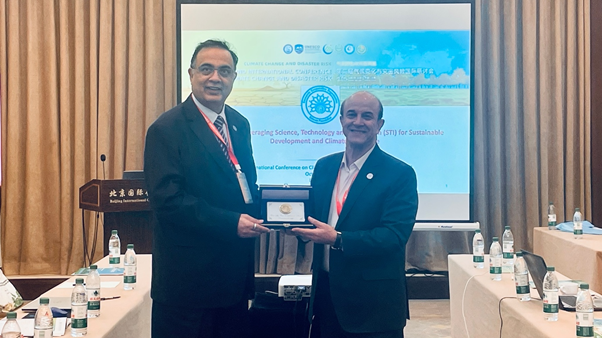
The keynote address was delivered by Prof. Shahbaz Khan, Director and Representative to the UNESCO Regional Office for East Asia (Beijing), on “Leveraging Open Science and Open Data for Water Security.” Prof. Khan highlighted the transformative role of open science and data-sharing frameworks in improving water resource management and policy integration. He underscored how accessible data can foster collaboration among nations and stakeholders, enabling evidence-based decision-making and early warning systems for droughts and floods. Prof. Khan also called for strengthened regional partnerships to harness technology and innovation for sustainable water governance, particularly in addressing the shared challenges posed by climate change.
Subsequent presentations reflected the diversity of scientific perspectives and solutions from across the ECO region:
- Ismail Koyuncu(TÜBA, Türkiye) presented on “STI for Sustainable Development and Climate Resilience in Türkiye,” showcasing innovative water treatment and sustainability initiatives in Türkiye’.
- Xu Chong(National Institute of Natural Hazards, China) shared insights on “Geological Hazards: Data, Mechanisms, Technologies, and Applications,” emphasizing the role of big data and hazard modeling.
- Khalil Raza(ECOSF, Pakistan) spoke on “Electric Mobility for the ECO Region: Driving Climate Mitigation and Greener Urban Futures,” highlighting e-mobility as a strategic pathway for transport decarbonization.
- BI Shuli (Alex)(World Green Design Organization, China) presented on “Application of Green Design in Emergency Disaster Prevention,” demonstrating how sustainable design principles can enhance disaster preparedness and recovery systems.
- Yang Wentao (Beijing Forestry University, China) spoke on “Leveraging AI & RS for Disaster Risk Reduction: Landslide, Typhoon & Flood,” demonstrating how artificial intelligence and remote sensing technologies can improve disaster prediction and rapid response.
- Mehdi Abedi (Tarbiat Modares University, Iran) presented on “Seven Hazards, One Region: Toward a Unified Climate Response in ECO Countries,” emphasizing the need for regional coordination and policy harmonization to address cross-border climate risks.
- Xiwei Xu (China University of Geosciences, China) discussed “Response Differentiation and Risk Reconstruction of Extreme Precipitation,” analyzing how extreme weather events evolve under shifting climatic conditions and the importance of adaptive risk management.
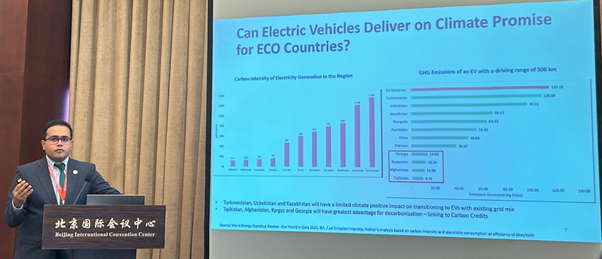
In his closing remarks, Prof. Tayebi, President of ECOSF, expressed sincere appreciation to all speakers and participants for their valuable contributions. He reiterated ECOSF’s commitment to fostering science, technology, and innovation for climate resilience, and emphasized the importance of continued cooperation among ECO Member States and Chinese institutions for building a sustainable and disaster-resilient future.
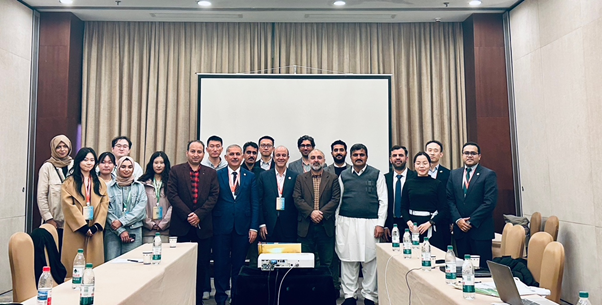
ECOSF Contributed to the Roundtable on the International Program on Resilience for Emerging Disaster Risks (REDR)
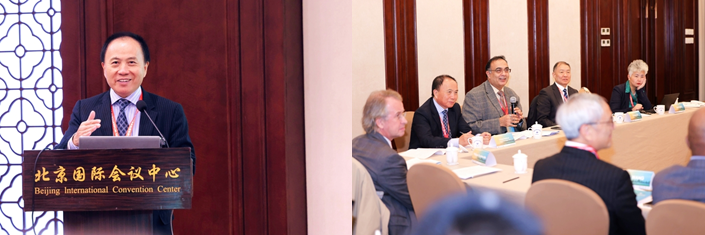
ECOSF also played an active role in the Roundtable on the Proposal for the International Program on Resilience for Emerging Disaster Risks (REDR) held on October 19, during the sidelines of the IC-CCDRR.
Prof. Shahbaz Khan, Director, UNESCO Beijing Office, opened the session by emphasizing the importance of understanding the evolving nature of disasters and the need for adaptive and collaborative approaches to Disaster Risk Reduction (DRR).
Prof. Hong Tianhua, Executive Director, China-Pakistan Joint Research Center on Earth Sciences; Secretary to UNESCO Chair for Mountain Disaster Risk Reduction and Resilience introduced all the participants.
Prof. Yang Saini, Co-holder, UNESCO Chair for Mountain Disaster Risk Reduction and Resilience. Prof. Yang Saini presented a detailed proposal titled “International Program on Resilience for Emerging Disaster Risks (REDR)”, aimed at strengthening global and regional cooperation to address evolving disaster challenges.
President Prof. Seyed Komail Tayebi contributed to the high-level dialogue, emphasizing the need for regional cooperation and STI-based resilience frameworks under the ECO Regional Framework for Disaster Risk Reduction (DRR). Prof. Tayebi emphasized the regional cooperation is crucial in DRR as it allows for shared resources, knowledge, and strategies. ECO countries can work together to develop early warning systems, share best practices, and coordinate response efforts. Mr. Khalil Raza additionally served as the technical rapporteur for the roundtable, compiling key insights and recommendations for future regional collaboration.
REDR initiative seeks to:
- Enhance international collaboration in research, policy dialogue, and capacity development for disaster risk reduction.
- Integrate science, technology, and innovation to build resilience against emerging and compound disaster risks.
- Establish a global network of academic and research institutions to jointly develop solutions for risk identification, prevention, and adaptive recovery.
- Promote the use of cutting-edge technologies, including AI-driven early warning systems, geospatial tools, and open data platforms, to improve forecasting and decision-making.
- Strengthen community-level resilience through participatory approaches and inclusive frameworks, ensuring that vulnerable groups are not left behind.
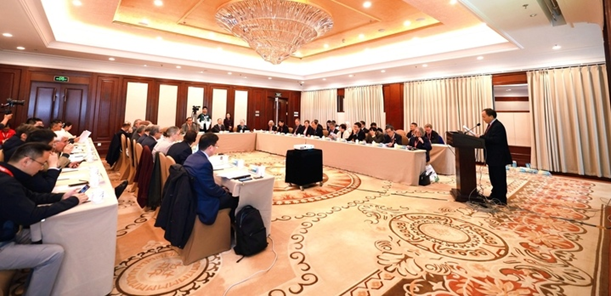
The roundtable concluded with an open discussion emphasizing stronger regional networks, data-driven decision-making, and inclusive strategies to strengthen community-level resilience and sustainability.
President ECOSF Serves as Panelist in Thematic Forum on Emerging Climate Risks during the conference.
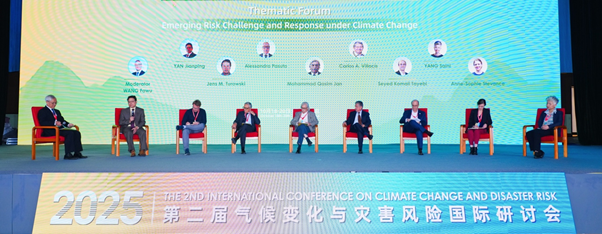
President Prof. Tayebi was also invited as a panelist in the Thematic Forum on Emerging Risk Challenge and Response under Climate Change, where he shared the stage with globally leading experts on Climate Change and Disaster Risks. Prof. Tayebi underlined the growing vulnerability of the ECO region to complex, cross-border climate risks such as glacial lake outbursts, flash floods, and droughts.
In his remarks, he stressed the need for:
- Strengthening science-policy interfaces for early warning and resilience planning,
- Promoting climate education and public awareness through the IBSE pedagogy, and
- Investing in regional STI ecosystems that foster innovation, open science, and digital transformation in risk management.
- Regional cooperation and shared innovation to strengthen the regional DRR framework through STI partnership, joint research and capacity programs.
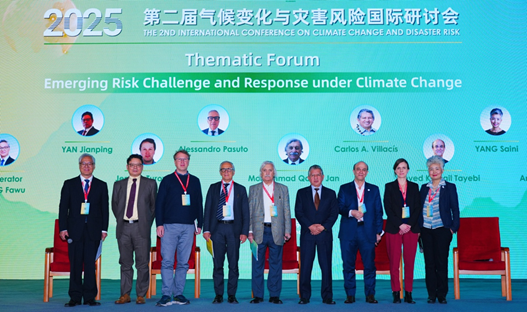
Prof. Tayebi reaffirmed ECOSF’s commitment to advancing science-driven collaboration across the ECO Member States, particularly in areas of disaster preparedness, climate adaptation, and sustainability transitions.
At the closing ceremony of the Conference, President Tayebi conveyed his sincere gratitude to Prof. Hong Tianhua, Executive Director of CPJRC, and the entire organizing team for their exemplary collaboration and hospitality. President Tayebi also expressed his commitment to further enhancing cooperation and expanding this initiative throughout the broader ECO region.
